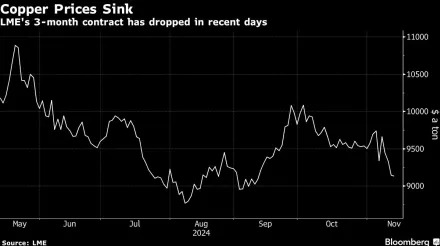(Bloomberg) -- China needs to deploy more economic stimulus if copper demand is to revive, according to a major importer of the metal.
The government has issued a slew of measures since late September to shore up confidence in the world’s biggest buyer of metals, where a prolonged slowdown in the property market is dragging on growth. Despite the huge sums offered, copper prices have dropped in recent days, in part due to concerns over a lack of fiscal support from Beijing.
The finance ministry’s most recent pledges included $1.4 trillion to bail out heavily indebted local governments, but stopped short of the direct steps to unlock consumer spending that the market craves.
“The latest stimulus is to refinance local government debts, so that’s not going to boost physical demand much,” Ni Hongyan, vice general manager of Singapore-registered Eagle Metal International Pte, said in an interview on Tuesday at the company’s office in downtown Shanghai.
The copper market in China is at a critical juncture. Enthusiasm for the metal deemed crucial to the world’s energy transition is being undercut by domestic oversupply, as well as concerns that Donald Trump’s election victory in the US will bring more tariffs on Chinese goods.
Moreover, Chinese demand growth is likely to slow and consumption could peak at the end of the decade, according to Beijing Antaike Information Development Co. The state-backed researcher sees an impact from a slowing economy, as well as efforts from clean energy industries to reduce the amount of copper in their products, or find alternative materials.
Eagle Metal handles roughly 10% of China’s refined copper imports, according to the company. Last year, the nation’s total was 3.7 million tons. More than half of its customers are fabricators, which shape the metal for use by manufacturers.
China’s relentless expansion of its own smelting capacity is crowding out supplies from overseas. That means the company is looking for opportunities elsewhere next year, including in Vietnam and South Korea, where copper demand from electric vehicles is rising, said Leah Li, general manager assistant.
On the Wire
China indicated its discomfort with yuan weakness through its daily reference rate for the currency amid the threat of higher US tariffs under a Donald Trump administration.
China’s retail new-energy vehicle sales may rise almost 50% in 4Q based on sales trends to date as buyers rush to showrooms before government subsidies for auto trade-ins expire at year-end, according to Bloomberg Intelligence.
Donald Trump’s impending return as US president will probably have minimal impact on China’s solar industry, BI said.
The Week’s Diary
(All times Beijing unless noted.)
Wednesday, Nov. 13:
Thursday, Nov. 14:
Friday, Nov. 15:


